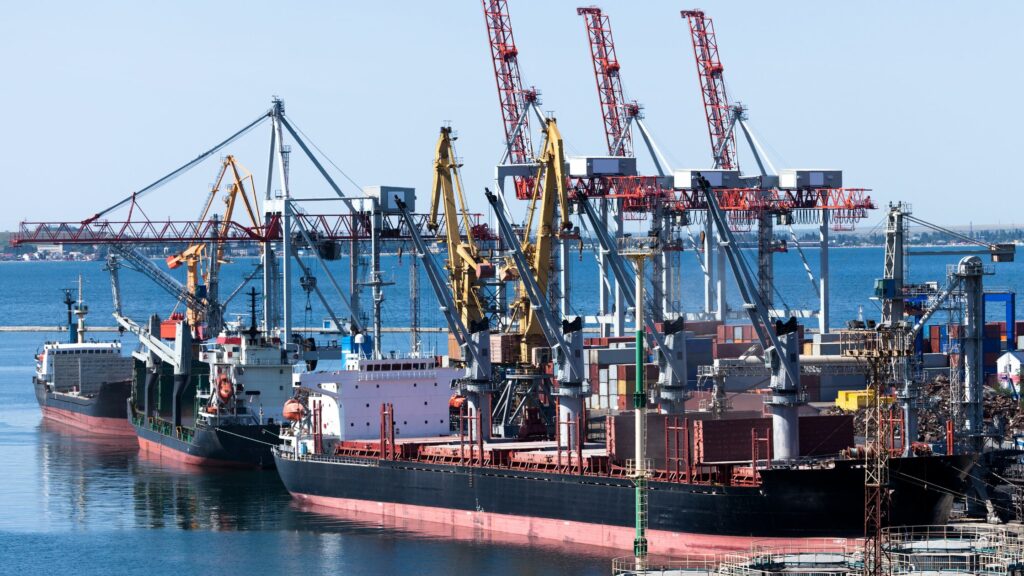Physical Address
304 North Cardinal St.
Dorchester Center, MA 02124

Shipping brokerage services, often overshadowed by the giants of freight forwarding and logistics companies, carve out their unique niche with unparalleled expertise and personalized service. This distinct approach sets them apart in the vast world of shipping, offering a specialized experience that distinguishes shipping brokerage as a category in its own right. Key services of shipping brokerage include cargo space booking, negotiation of shipping rates, and handling of documentation, each known for their critical role in the shipping process.
Bulk shipping brokerage services also stand out, offering tailored solutions for large-scale commodity trading that requires a deep understanding of market dynamics. Going a bit deeper, each type of shipping brokerage service presents its own set of benefits, operational techniques, historical significance, and recommendations for optimizing the shipping process. The following sections will explore these aspects in detail, providing a richer understanding of what makes shipping brokerage services an indispensable partner for businesses worldwide.
Demurrage refers to the charges that businesses incur when cargo remains at a port beyond the allotted free time. This concept is crucial in shipping and logistics, acting as a financial penalty for delays in loading or unloading goods. Essentially, demurrage serves as an incentive for companies to move their shipments efficiently, ensuring that ports remain clear and available for incoming and outgoing cargo.
The charges begin to accrue once a predetermined period, known as “free time,” expires, and continue until the cargo is removed from the port premises. Understanding demurrage is vital for businesses to manage their shipping costs effectively and avoid unnecessary expenses.
Companies incur demurrage charges primarily due to delays in the shipping process. These delays can occur for various reasons, including delays in loading or unloading cargo, which might be due to logistical challenges or inefficiencies. Additionally, if a shipment exceeds the storage time allowed at a port or terminal, demurrage charges start to apply.
Sometimes, delays in acquiring docking permission from the port or local authorities can also lead to demurrage. Essentially, any delay that prevents cargo from being moved off the port premises within the designated free time contributes to demurrage charges. These charges are a financial penalty meant to encourage the efficient use of port facilities and ensure a smooth flow of goods through the supply chain.
To illustrate the point more vividly, consider the following real-life scenario:

A textile company, FabricCo, faced significant demurrage charges when their shipment of raw materials was delayed at the port due to unexpected customs clearance issues. The cargo, which was critical for their production line, was held up for an additional two weeks beyond the allotted free time, accruing substantial demurrage fees. Situation: FabricCo’s shipment arrived on time, but discrepancies in the documentation led to a delay in customs clearance.
The required corrections took longer than anticipated, partly due to a backlog at the customs office and partly due to communication delays between FabricCo, their local agent, and the supplier. Outcome: The delay resulted in demurrage charges amounting to several thousand dollars. This unexpected cost impacted FabricCo’s cash flow and delayed the production of a new clothing line, affecting their sales and revenue projections for the quarter.
Delays in loading cargo onto a vessel can stem from a variety of factors, such as logistical challenges, lack of coordination, or unforeseen circumstances. These delays can cause a ripple effect, leading to increased waiting times and, consequently, demurrage charges.
Similarly, delays in unloading cargo from a vessel can lead to demurrage charges. This might occur when there are inefficiencies in port operations, labor disputes, or issues with cargo documentation, preventing timely access to the goods.
When cargo remains in a port or terminal longer than the agreed free time, it incurs demurrage charges. This excessive storage time could be due to documentation problems, customs clearance delays, or issues with inland transportation.
At times, vessels may face delays in acquiring docking permission due to port congestion, administrative delays, or priority given to other ships. These delays in docking can lead to a backlog of unloading activities, resulting in demurrage charges. This case study exemplifies how unexpected issues, such as customs clearance delays, can lead to significant demurrage charges, underscoring the importance of meticulous planning and coordination in the shipping process.
Demurrage calculation is primarily based on the contract terms between the shipper and the carrier, which outline the free time allowed and the daily rates applied thereafter. Once the free time expires, demurrage charges start to accrue at a predetermined daily rate. This rate is usually specified in the shipping contract or agreement and can vary depending on the port, type of cargo, and specific terms negotiated between the parties involved.
The focus of this calculation method is to compensate the carrier for the time their asset is tied up beyond the agreed period, encouraging efficient cargo movement and utilization of port facilities. To provide clearer guidance on how demurrage is calculated across different ports and carriers, including variations in free time and daily rates, the following table offers detailed examples:
| Port/Carrier | Free Time | Daily Rate (after free time) | Cargo Type | Additional Notes |
|---|---|---|---|---|
| Port A | 3 days | $100/day | General | – |
| Carrier B | 5 days | $150/day | Refrigerated | Higher due to refrigeration costs |
| Port C | 7 days | $75/day | Bulk | Discounts for large volumes |
| Carrier D | 4 days | $200/day | Hazardous | Includes premium for handling risks |
| Port E | 2 days | $125/day | General | Weekend days not counted in free time |
The calculation of demurrage charges is fundamentally based on contract terms agreed upon between the shipper and the carrier. These terms delineate the free time — the period during which the cargo can be stored at the port without incurring additional charges. The specifics of these terms, including the length of free time and the conditions under which it applies, can significantly influence the eventual demurrage costs.
Once the allotted free time expires, daily rates start to apply. These rates are predetermined and specified within the contract, setting a fixed charge for each day the cargo remains at the port beyond the free period. The daily demurrage rates are designed to encourage the timely movement of cargo and compensate the carrier for the extended use of their space or equipment.
Demurrage charges have significant implications for businesses, impacting both financial health and operational efficiency. Firstly, they can impact cash flow by adding unexpected costs to the shipping process, which may affect a company’s budgeting and financial planning. Additionally, demurrage charges can delay access to goods for sale, potentially affecting sales cycles and customer satisfaction.
They also increase operational costs, making the overall process of shipping more expensive and less predictable. Furthermore, demurrage can have a negative impact on supply chain efficiency, leading to delays and requiring businesses to reallocate resources to manage and mitigate these delays. Overall, understanding and managing demurrage charges is crucial for maintaining smooth operations and controlling costs within the shipping industry.
To provide more detailed examples of how demurrage charges have impacted businesses financially and operationally, consider the following case study:
A global electronics manufacturer, ElectroGlobal, experienced a significant disruption in their supply chain due to demurrage charges, which led to a cascade of operational and financial challenges. Situation: ElectroGlobal’s shipment of critical components was delayed at a foreign port due to a sudden strike by port workers. The strike extended beyond the free time period, resulting in substantial demurrage charges.
The delay in receiving these components forced ElectroGlobal to halt production lines for one of their bestselling products. Financial Impact: The demurrage charges amounted to over $500,000. Additionally, the halt in production led to delayed product shipments to retailers, resulting in lost sales and strained relationships with key retail partners.
Operational Impact: The disruption in the supply chain caused by the demurrage charges required ElectroGlobal to reallocate resources to expedite alternative shipments of components and manage the backlog of production. This reallocation of resources diverted attention from other strategic projects, further impacting the company’s operational efficiency. Long-term Effects: The incident prompted ElectroGlobal to reevaluate their supply chain and logistics strategies, including building stronger relationships with shipping brokers and investing in technology to better track shipments and predict potential delays.
Demurrage charges directly impact a business’s cash flow by introducing unforeseen expenses. These costs can consume funds allocated for other operational needs, affecting overall financial stability.
Demurrage can significantly delay access to goods, hampering a business’s ability to sell and distribute products timely. This can lead to missed sales opportunities and dissatisfied customers.
The accumulation of demurrage charges increases operational costs, making the logistics component of business more expensive. This can erode profit margins and necessitate price adjustments.
Demurrage charges signal inefficiencies within the supply chain, indicating bottlenecks that impact overall supply chain efficiency. These inefficiencies can disrupt planned operations and lead to broader logistical challenges.
Beyond impacting efficiency, demurrage directly causes delays in the supply chain, slowing down the movement of goods and potentially affecting downstream supply chain activities.
To address the challenges posed by demurrage, businesses often need to reallocate resources to manage and mitigate delays. This can involve dedicating staff to resolve the issues or reallocating financial resources to cover the additional costs. This case study of ElectroGlobal illustrates the multifaceted impact that demurrage charges can have on a business, from immediate financial costs to long-term operational and strategic adjustments.

Businesses can significantly reduce demurrage costs through strategic planning and efficient operations. Implementing strategies for reducing waiting time, such as better scheduling of cargo loading and unloading, can prevent delays. Improving coordination with transportation carriers ensures that all parties are aligned and can adapt to changes swiftly.
Additionally, enhancing logistics and planning operations with advanced tools and technologies can provide real-time insights, allowing for proactive adjustments. Negotiating better terms with carriers and ports can also afford businesses more flexibility and lower daily rates. Furthermore, securing longer free periods before demurrage starts and striving for lower daily demurrage rates can provide a buffer against unforeseen delays, minimizing the financial impact.
Together, these strategies can help businesses navigate the complexities of shipping logistics more effectively, reducing the risk and cost of demurrage.
Implementing strategies to reduce waiting time at ports can significantly lower demurrage costs. This includes precise scheduling of cargo loading and unloading activities and optimizing the timing of shipments to avoid peak congestion periods.
Improving coordination with transportation carriers involves clear communication and planning to ensure that cargo moves efficiently through each stage of the shipping process. This helps in avoiding unnecessary delays that lead to demurrage charges.
Enhancing logistics and planning operations with advanced technology and software provides businesses with real-time visibility into their supply chain. This enables better decision-making and the ability to anticipate and mitigate potential delays before they result in demurrage.
Negotiating better terms with carriers and ports can yield more favorable conditions for businesses, such as extended free time and lower demurrage rates. Building strong relationships with these partners can also lead to more flexibility in handling unforeseen delays.
Securing longer free periods before demurrage charges begin to accrue gives businesses a larger buffer to manage and complete cargo operations. This can be crucial in avoiding the financial impact of demurrage during periods of unexpected delays.
Lowering daily demurrage rates through negotiations can significantly reduce the financial burden on businesses when delays are unavoidable. Achieving lower rates requires understanding the standard industry rates and leveraging relationships with carriers and ports.